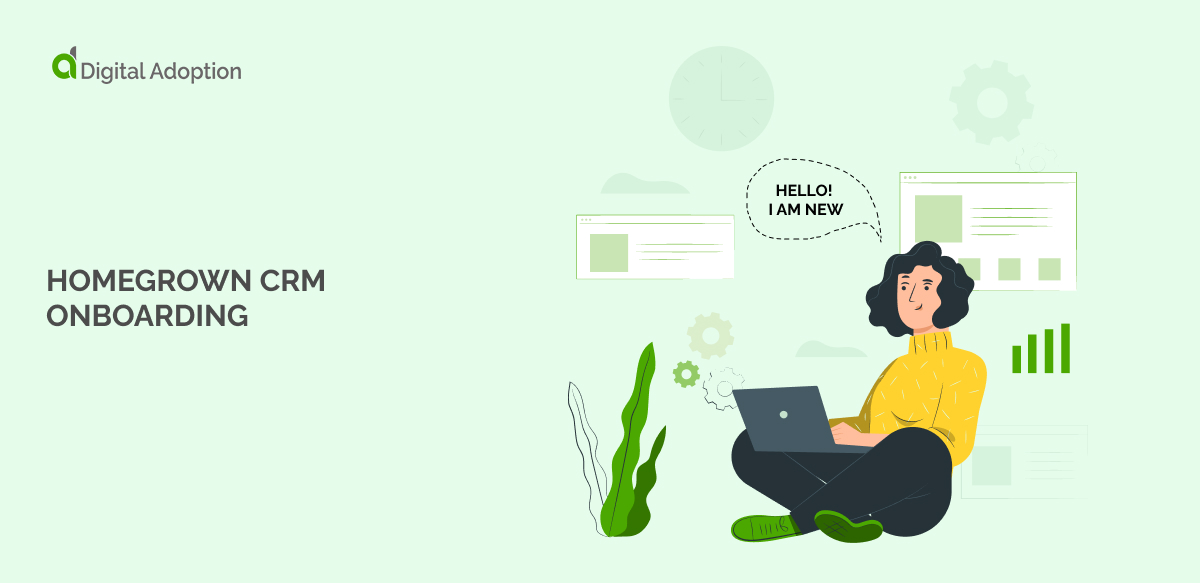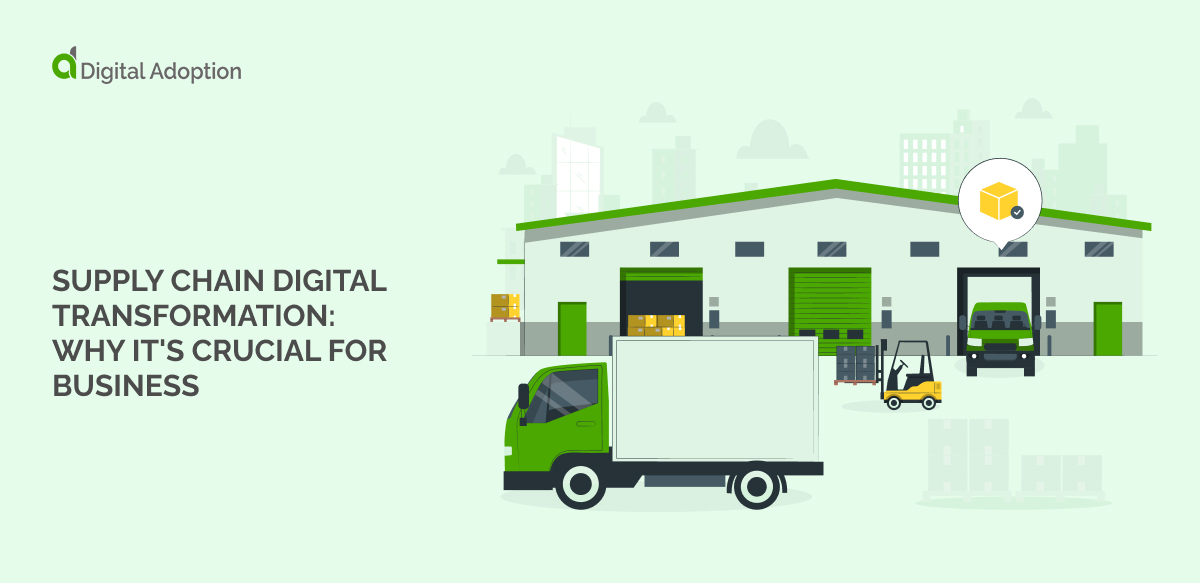Homegrown CRM solution can be a great way to get your employees up and running on your company’s custom-built customer relationship management (CRM) system. It helps ensure they have the skills to use the CRM effectively while ensuring everyone is on the same page regarding data entry and other business processes.
Further, Digital transformation is more important than ever in the modern business environment, and your CRM onboarding should reflect this. You can ensure that everyone is working efficiently and using all of its capabilities by providing employees with training on how to use the system.
Employees should be given clear instructions on entering data into the CRM, managing customer relationships, and using the system’s reporting capabilities.
Using onboarding goals and objectives bolsters the overall concept of digital adoption. These should include understanding the CRM technology, maintaining customer relationships, using analytics and reporting capabilities to improve performance, and providing customer support using the system to truly enhance digital adoption.
This guide will examine why homegrown CRM onboarding is important, what you should consider when getting started, essential CRM management solutions, and some best practices for ensuring your new employees are set up for successful business relationships.
- What Is A Homegrown CRM?
- Why Is Homegrown CRM Onboarding Necessary?
- Who Uses Homegrown CRMs?
- How Do Homegrown CRMs Work?
- The Homegrown CRM Onboarding Process
- Homegrown CRM Integration And Automation
- Homegrown CRM And Cross-Selling
- Onboarding Statistics That Reaffirm The Importance of Effective CRM Onboarding
- The Future of Homegrown CRM Onboarding
- 8 Tips for smooth homegrown CRM onboarding
What Is A Homegrown CRM?
CRM, known as Customer Relationship Management, is a practice dedicated to forming and sustaining relationships with current and prospective customers.
An effective CRM platform is a powerful tool that can help transform leads into loyal customers in no time. This software offers a variety of features and solutions to streamline the customer journey, from lead generation, nurturing, conversion rate optimization, and more.
A custom CRM is a bespoke CRM designed to meet your organization’s needs. It typically has more capabilities than an off-the-shelf CRM and is often tailored to the company’s needs.
Many businesses fail to successfully implement an onboarding program, but technological advances like CRM allow them to monitor and optimize their initiatives. Utilized as a complement to the core function of CRM, customer-focused campaign management (with an emphasis on onboarding) can revolutionize the new user experience.
Not only does a homegrown CRM system provide basic task and contact management, but its real power is revealed when we look at automated touchpoints, data integrations, and cross-selling.
By utilizing the system in this way, companies can ensure that any potential problems are addressed before they arise, no client falls through the cracks unnoticed, and every opportunity to strengthen customer relationships is seized quickly.
Why Is Homegrown CRM Onboarding Necessary?

Homegrown CRM onboarding is important because it helps employees understand how to use the system correctly and efficiently. Without proper onboarding, they may struggle with using the software or not get optimal performance.
When done properly, onboarding can also help ensure that everyone in the organization follows uniform processes regarding data entry and other tasks related to customer relationship management.
Who Uses Homegrown CRMs?
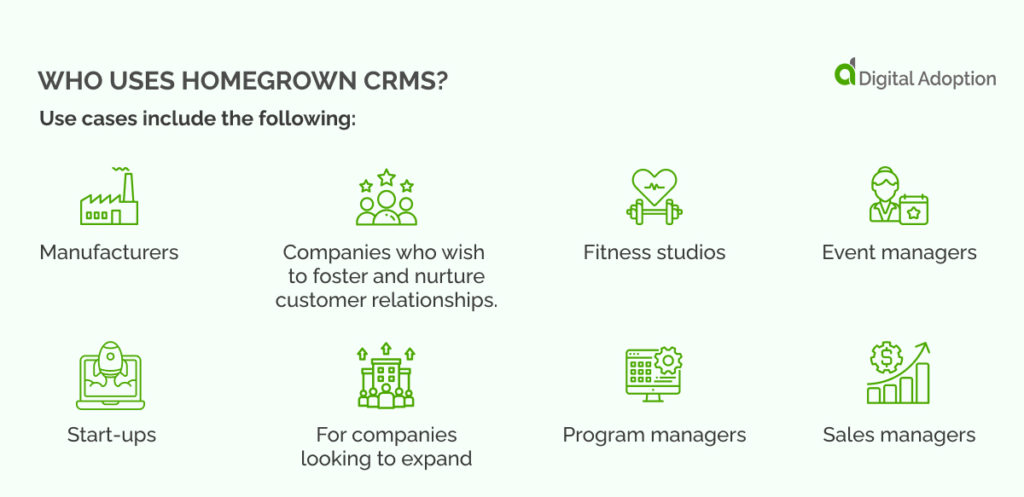
Homegrown CRMs are used by companies of all sizes, from startups to multinational corporations. It is particularly helpful for larger organizations that need a more tailored solution to meet their specific needs.
These CRMs can also be helpful for companies with complex processes requiring much customization. With the right onboarding, everyone in the organization can be up to speed and ensure that the CRM works effectively.
Use cases include the following:
- Manufacturers can leverage a CRM to connect with distributors and foster stronger relationships.
- Leveraging a CRM can be an invaluable asset for companies who wish to foster and nurture customer relationships.
- Fitness studios can use a CRM to attract new students and grow their businesses.
- Event managers can leverage the power of CRM to bolster relationships with their vendors.
- Start-ups may leverage a CRM to manage investor relationships effectively.
- For companies looking to expand, a CRM can be an invaluable tool for cultivating partner relationships.
- Program managers can easily leverage a CRM to manage their affiliate programs and boost profitability.
- Sales managers who want to expand their scope and credibility.
How Can A Homegrown CRM Help Your Business Succeed?
Forrester’s research reveals that 50% of sales teams who adopted a CRM witnessed an incredible rise in productivity levels. With the use of CRM software, small businesses have achieved numerous business objectives: increasing revenue, heightening team collaboration, shortening the sale process timeline, expediting response times, and countless more.
CRM onboarding is an important part of ensuring that everyone in the organization can use the system efficiently and effectively. It helps ensure that employees have the knowledge and skills necessary to get the most out of the CRM while streamlining processes for data entry and other tasks.
In the digital age, business success determines how well companies interact with customers. With a homegrown CRM, you can capitalize on this opportunity and ensure that your new employees are set up for success. A CRM vendor can provide the right platform to streamline customer relations, enabling you to create a unified customer experience.
CRM reporting and analytics give you real-time insights into customer behavior, helping you to identify areas of improvement and opportunities for growth. With automated processes in place, customer interactions become easier to manage, inspiring customer loyalty.
Software developers, including those at the development agency you’re working with, should also be involved in CRM implementation. The right developer can look after core business needs by integrating your existing systems with the CRM for a smooth transition.
By providing comprehensive onboarding, you can guarantee that your customer relationships stay strong and remain beneficial to the growth of your organization. From lead nurturing to customer loyalty programs and beyond, your CRM can help you stay ahead of the technology adoption curve and increase your competitive advantage.
How Do Homegrown CRMs Work?

Unlock the power of CRM to enhance your team’s ability to form and sustain relationships with leads. It does this by offering helpful resources such as:
- Streamlining all your processes allows you to manage a high volume of leads effectively.
- Assigning responsibility will ensure that your leads are attended to with care and precision.
- Enhance the customer experience by providing rapid and customized replies to ensure a fulfilling journey.
- Locate and eliminate workflow processes that are depleting valuable time.
- Uncover the strategies that will help you boost your sales and grow your business.
- Carefully examine shoppers to comprehend your perfect customer persona.
- Craft targeted advertising campaigns to reach the most relevant audiences.
- Glimpse team progress and performance to maximize efficiency.
The Homegrown CRM Onboarding Process
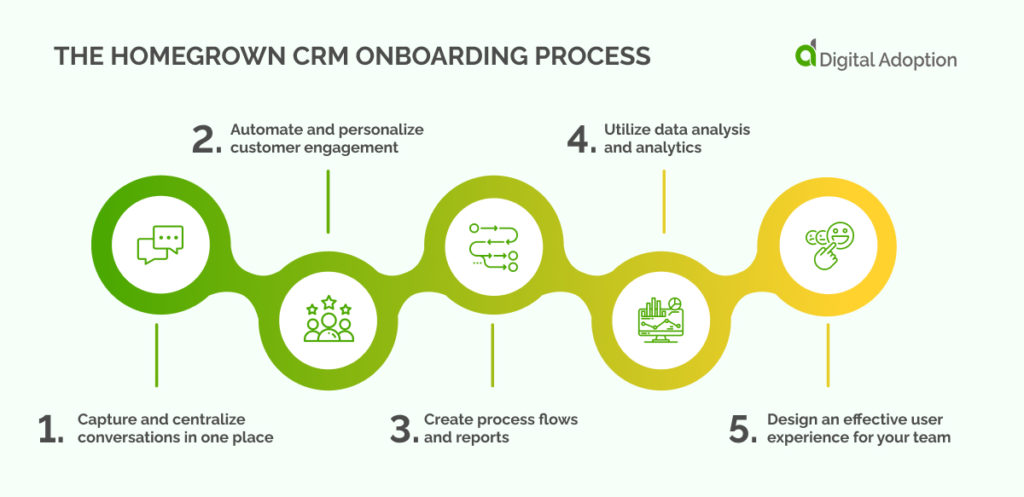
The following process can be used as a guide for setting up your homegrown CRM:
1. Capture and centralize conversations in one place
Customers expect businesses to offer seamless communication through various social network platforms, instant messengers, and text messaging.
Despite the significant advantages, smaller and medium-sized companies may struggle to incorporate and keep up these networks. Difficulties include:
- What is the best way for your team to access WhatsApp? Do you have a shared phone number?
- Do you require someone exclusively dedicated to responding to messages?
- Are you curious about how to maximize your response time?
- Have you ever worried about what would happen if you failed to answer?
2. Automate and personalize customer engagement
A homegrown CRM onboarding process should also explore ways to automate conversations and provide personalized experiences.
This means utilizing automation and machine learning to collect customer data, analyze it to predict future behavior, and build profiles of customers based on their input.
With this, you can create an individualized journey for each lead or customer tailored to their preferences, which means no two customer experiences will be the same.
3. Create process flows and reports
The onboarding process should focus on developing workflow processes that help manage data entry tasks and reports. This will streamline your daily operations and provide insights into your CRM performance.
By creating automated process flows and reports, you can quickly identify areas of improvement and implement new strategies to maximize your team’s efficiency. Process flows are important because they hold your team accountable and ensure they follow the correct processes.
4. Utilize data analysis and analytics
Data and analytics have become a vital tool for businesses as it helps them make informed decisions based on customer feedback and other data-driven insights.
Homegrown CRMs provide valuable analytics that can be used to develop targeted campaigns, analyze customer churn, and identify customer behavior trends. With these analytics, you can more accurately measure key performance indicators and track progress.
5. Design an effective user experience for your team
The onboarding process should also focus on creating an intuitive and simple user experience.
Your team needs to be able to access the platform quickly, understand its features and functions, and take advantage of the CRM’s data to make informed decisions. Designing an effective user experience means providing helpful resources and regularly updating existing ones.
By following this process, you can ensure that your homegrown CRM offers an efficient and reliable customer experience while helping you reach new heights in business growth. With the right strategy and processes in place, there is no limit to what your team can achieve with a homegrown CRM.
Homegrown CRM Integration And Automation
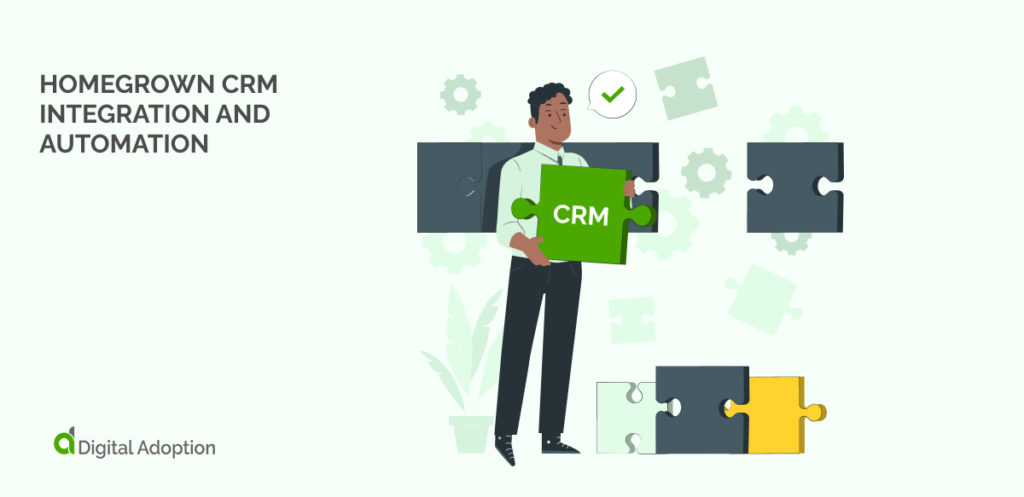
It’s easy to see how customers can be ignored in the billing process. When clients make payments after receiving their initial invoice, accounting departments are aware, but other company sections may not have access to this information.
When a client awaits product delivery or to verify that their payment has been received, accounting staff must routinely alert cross-functional departments. Otherwise, the customer would be left limbo without notification of services rendered.
The company can gain unprecedented insight into a client’s behaviors by combining financial data with customer info stored in CRM. Plus, this useful knowledge can be accessed by anyone who uses CRM- generally, many more people than those accessing accounting software. Whenever a payment is received, the customer service team will automatically get notified, and they can then initiate a call or send an email to check up on the client.
By linking staff and patrons with digital data, CRM facilitates a personalized experience that breeds loyalty and fulfills customer expectations. This ensures every individual feels included in the company’s mission and is delighted by their interaction.
Homegrown CRM And Cross-Selling

Companies often claim that “everyone is a salesperson,” meaning all employees should be alert to customer needs and willing to address them. While the concept works well on paper, in practice, it can prove difficult as selling requires training and confidence many employees may not possess.
The perfect time for introducing these “soft sales” conversations about purchases and money is during onboarding when customers are familiar with what the company offers and are more likely to be open-minded towards potential opportunities.
With CRM, sales conversations become more effectively managed and personalized. Employees can use cross-sell recommendations to present customers with products or services that suit their needs based on what they have previously purchased. This contextually relevant information allows businesses to provide the best possible solutions for their customers, which are likely to be welcomed warmly.
As customers’ expectations become increasingly higher and competition more fierce, today’s businesses must be acutely aware of the slim margin for error they possess when interacting with their customer base. A strategic sales roadmap designed to meet customer needs and create a positive experience is essential for your business to succeed.
At even greater risk are those initial days when a new customer has started to engage with the company; as such, it is paramount that companies get it right from the go in terms of product delivery and follow-up communication through any combination of phone calls, emails, letters or seminars/training courses.
Onboarding can be an absolute madhouse for even the biggest and most well-supplied businesses, but it’s much harder on small companies. Fortunately, Customer Relationship Management (CRM) software solves this issue by automating customer touchpoint notifications, displaying all customers’ information in one spot, and providing timely cross-sales data – making onboarding a breeze.
The behind-the-scenes technology provides customers with a seamless, responsive experience attuned to their individual needs without being too aggressive or aloof. It’s hard to create the perfect customer experience, yet doing so can develop loyalty and ensure your customers remain loyal for years.
Onboarding Statistics That Reaffirm The Importance of Effective CRM Onboarding

The following statistics capture the state of onboarding processes in 2022 and beyond:
- Navigating the onboarding process of a new corporate client could take up to 100 days on average.(McKinsey & Company)
- Nearly three-quarters of businesses with large operations have a devoted customer onboarding team to ensure their customers experience the best quality service. (Precursive)
- A meager thirteen percent of small and medium-sized businesses use customer success software, while the majority (54%) are likely to require payment for onboarding. (Precursive)
Onboarding is an increasingly important part of any business’s customer service strategy. With the help of CRM, companies can keep track of customers from initial contact through to lengthy relationships. By focusing on user data and creating a personalized onboarding experience, businesses can increase customer satisfaction rates, reduce churn, and enjoy long-term success.
CRM software allows companies to monitor onboarding progress in real-time with detailed analytics that provides insights into user behavior — what activities are they performing? How much time do they spend on each task? Are there any potential pitfalls or areas where users might need more assistance?
This information is invaluable for understanding how customers interact with your product and devising the most effective onboarding strategy. This data can also give users timely tips and insights throughout their journey, ensuring they get the most out of your product or service.
Furthermore, CRM software allows companies to run various customer onboarding campaigns. From discounts and free trials to referrals and loyalty rewards, businesses can create a personalized experience that will leave customers feeling valued and connected to your brand—ultimately leading to higher satisfaction rates.
Statistics show that customers are more likely to stick with a company if they have a practical onboarding experience. CRM software provides the tools and insights needed to ensure that your customers get the best service possible during their initial interactions with your business.
With its ability to automate processes and monitor customer data, CRM can give businesses a competitive edge in offline and online settings.
By utilizing CRM Onboarding, companies can ensure they don’t miss out on the opportunity to build meaningful relationships with new customers right from the start. A successful onboarding process helps you win over customers, boosts loyalty, improves retention, and drives long-term success.
The Future of Homegrown CRM Onboarding
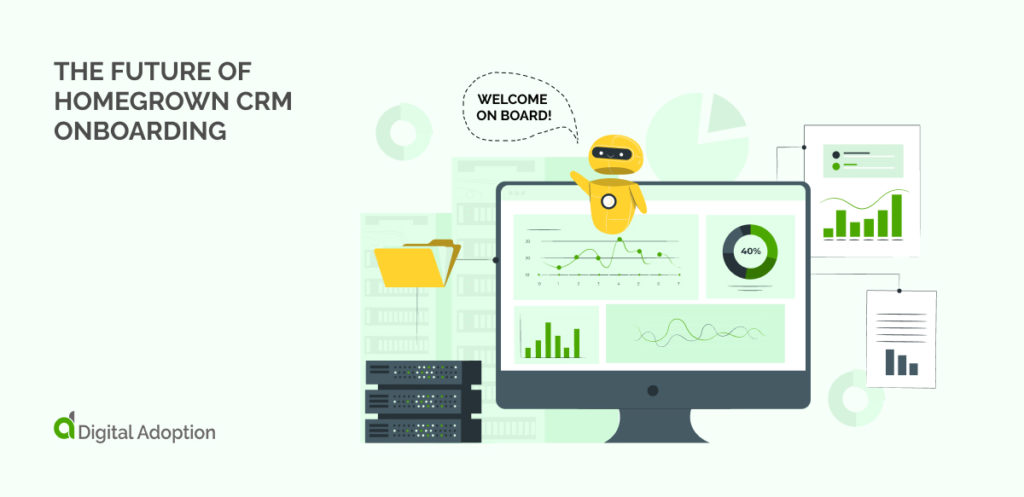
The future of homegrown CRM onboarding is bright. Companies are getting more creative with customer data to tailor the onboarding process and create a personalized experience for each user.
Automation tools allow companies to streamline manual processes and free up resources for other tasks, such as creating custom campaigns or A/B testing different approaches.
CRM software also provides actionable insights into customer behavior so companies can adjust their tactics if needed. As businesses adopt this technology, more personalization options will likely be available in the near future — from targeted marketing messages based on customer preferences to automated support tailored to individual users.
In sum, the power of CRM is undeniable when it comes to onboarding customers. By allowing companies to monitor customer journeys and run tailored campaigns, CRM can ensure that customers receive an exceptional experience, setting them up for long-term success.
By using CRM Onboarding, businesses are given the opportunity to create a unique customer journey that will leave a lasting impression. With this technology, companies can welcome new users openly and build relationships that will last for years.
Lastly, a custom solution can bolster sales processes by creating a more tailored customer experience. This puts users of homegrown CRMs at a great advantage because they have the power to customize the system to fit their needs.
8 Tips for smooth homegrown CRM onboarding
1. Develop a strategy to use CRM Onboarding effectively in your business.
2. Identify key areas of the customer journey where automation could help streamline processes and improve efficiency.
3. Analyze customer data to gain insights into user behavior and formulate targeted campaigns.
4. Create personalized messages, discounts, and offers for customers to ensure they get the best onboarding experience possible.
5. Monitor progress in real-time and make adjustments as necessary.
6. Track key metrics, such as customer retention and satisfaction scores, to measure success.
7. Implement a system for tracking customer feedback throughout the onboarding process so any issues can be dealt with quickly and efficiently.
8. Offer rewards or incentives for users who complete their onboarding journey successfully, helping to boost loyalty and increase retention numbers over time.
By following these steps, companies can take advantage of CRM Onboarding to ensure their customers get off to the best possible start and remain engaged with their brand in the long term.
And by leveraging CRM Onboarding, businesses can maximize customer engagement and develop lasting relationships that will keep them returning for more. Companies should use this technology to provide an optimal onboarding process and deliver a personalized experience that will make customers feel valued and connected to their brand.
With the right strategy in place, businesses can use CRM Onboarding to create a successful customer journey, making it easier for them to achieve their goals and reach new heights of success.

